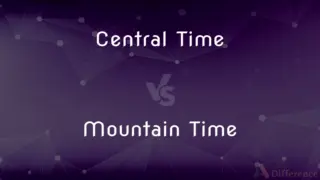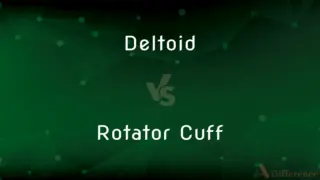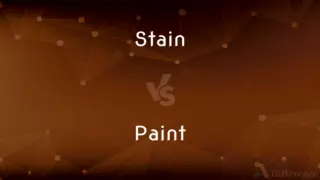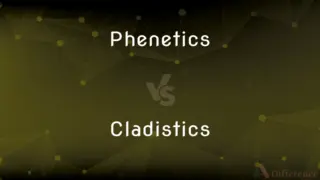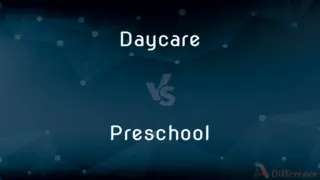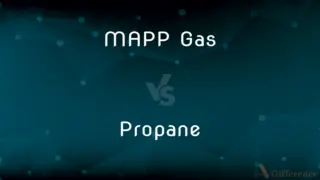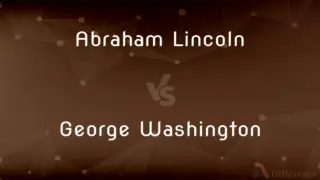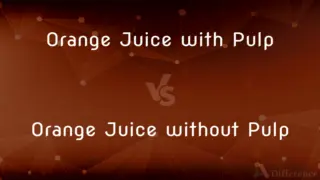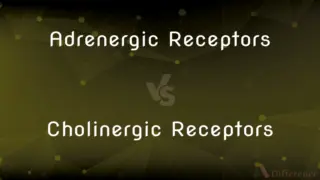Cheque vs. Cash — What's the Difference?
By Tayyaba Rehman — Updated on September 16, 2023
Cheque is a written order directing a bank to pay money, while Cash is physical currency like coins and notes.

Difference Between Cheque and Cash
Table of Contents
ADVERTISEMENT
Key Differences
Cheque and Cash represent two distinct forms of financial transactions. A Cheque is a document that orders a payment from one's bank account, while Cash is tangible currency that can be directly used for transactions.
For a Cheque to become money, it needs to be cashed or deposited, and funds must be available. In contrast, Cash requires no intermediate step and is instantly recognized as a medium of exchange.
Security measures for both differ as well. A Cheque may carry details like the payer's name, bank account number, and signature. Cash transactions, on the other hand, are typically anonymous unless recorded.
While Cash is universally accepted for in-person transactions, a Cheque requires the recipient to trust that the issuer has sufficient funds in their account, making it a deferred form of payment.
Lastly, while Cash can be easily used for small, immediate transactions, a Cheque can be used for larger amounts without needing to physically carry large sums of money.
ADVERTISEMENT
Comparison Chart
Nature
Written order to pay
Physical currency
Transaction Type
Deferred payment
Immediate payment
Anonymity
Contains payer's details
Typically anonymous
Usability
Requires bank processing
Universally accepted
Volume of Transaction
Suitable for large amounts
Convenient for small amounts
Compare with Definitions
Cheque
A document ordering a bank to pay from one's account.
She wrote a Cheque for her monthly rent.
Cash
The most immediate form of payment.
They prefer Cash payments at the local market.
Cheque
A deferred payment method requiring trust.
For the car, he provided a Cheque as a down payment.
Cash
Physical currency like coins and notes.
He paid for the pizza in Cash.
Cheque
A means to draw money from a bank account.
For his services, he accepted a Cheque.
Cash
Tangible money accepted universally.
For quick transactions, she always kept Cash on hand.
Cheque
A paper tool used to transfer money electronically.
I'll send the payment via Cheque tomorrow.
Cash
Direct and anonymous medium of exchange.
She bought the book with Cash to avoid a paper trail.
Cheque
An alternative to cash payments.
Instead of cash, she gave me a Cheque.
Cash
Money in a physical, spendable form.
When traveling, it's wise to have some Cash.
Cheque
A cheque, or check (American English; see spelling differences), is a document that orders a bank to pay a specific amount of money from a person's account to the person in whose name the cheque has been issued. The person writing the cheque, known as the drawer, has a transaction banking account (often called a current, cheque, chequing or checking account) where their money is held.
Cash
In economics, cash ( (listen) kash, or kaysh in AuE) is money in the physical form of currency, such as banknotes and coins. In bookkeeping and financial accounting, cash is current assets comprising currency or currency equivalents that can be accessed immediately or near-immediately (as in the case of money market accounts).
Cheque
An order to a bank to pay a stated sum from the drawer's account, written on a specially printed form
They presented him with a cheque for £4,000
Fees are payable by cheque or postal order
Cash
Money in the form of bills or coins; currency.
Cheque
Variant of check.
Cash
Liquid assets including bank deposits and marketable securities.
Cheque
A draft directing a bank to pay money to a named person or entity.
I was not carrying cash, so I wrote a cheque for the amount.
Sometimes abbreviations are used (which would be explained on the statement) and only the last three figures of the cheque number may be given. ‘Sundries’ are cash or cheques paid into the account.
You can avoid dealing with paper cheques — written or printed — by paying your bills online.
The daily cheque clearings began around 1770 when bank clerks met at the Five Bells (a tavern in Lombard Street in the City of London) to exchange all their cheques in one place and settle the balances in cash.
Cash
Money paid in currency or by check
Paid in cash.
Cheque
Obsolete form of chequy
Cash
Any of various Asian coins of small denomination, especially a copper and lead coin with a square hole in its center.
Cheque
See Check.
Cash
To exchange for or convert into ready money
Cash a check.
Cash in one's gambling chips.
Cheque
A written order directing a bank to pay money;
He paid all his bills by check
Cash
(uncountable) Money in the form of notes/bills and coins, as opposed to cheques/checks or electronic transactions.
After you bounced those checks last time, they want to be paid in cash.
Cheque
Withdraw money by writing a check
Cash
Liquid assets, money that can be traded quickly, as distinct from assets that are invested and cannot be easily exchanged.
Cash
Money.
Cash
Cash register, or the counter in a business where the cash register is located.
Let me just bring these to the cash for you.
Cash
An instance of winning a cash prize.
Cash
A place where money is kept, or where it is deposited and paid out; a money box.
Cash
Any of several low-denomination coins of India, China, or Vietnam, especially the Chinese copper coin.
Cash
(transitive) To exchange (a check/cheque) for money in the form of notes/bills.
Cash
(poker slang) To obtain a payout from a tournament.
Cash
To disband. To do away with, kill
Cash
(slang) Great; excellent; cool.
Cash
A place where money is kept, or where it is deposited and paid out; a money box.
This bank is properly a general cash, where every man lodges his money.
£20,000 are known to be in her cash.
Cash
Ready money; especially, coin or specie; but also applied to bank notes, drafts, bonds, or any paper easily convertible into money
Cash
To pay, or to receive, cash for; to exchange for money; as, cash a note or an order.
Cash
To disband.
Cash
A Chinese coin.
Cash
Money in the form of bills or coins
Cash
Prompt payment for goods or services in currency or by check
Cash
Exchange for cash;
I cashed the check as soon as it arrived in the mail
Common Curiosities
Why might someone prefer a Cheque over Cash?
Cheque payments can be tracked, are safer for large amounts, and provide a record.
Is Cash always accepted?
While Cash is widely accepted, some establishments might have a card-only policy.
Which is more convenient for small purchases?
Cash is generally more convenient for small, immediate transactions compared to a Cheque.
Can a Cheque be postdated?
Yes, you can date a Cheque for a future time, but Cash is always current.
Is there a risk of counterfeit with Cash?
Yes, counterfeit currency is a risk with Cash, whereas Cheque fraud exists in different forms.
Is a Cheque as good as Cash?
Not necessarily. A Cheque requires processing and depends on the issuer having sufficient funds, while Cash is instant.
Can a Cheque bounce, unlike Cash?
Yes, a Cheque can bounce if there aren't enough funds, while Cash is straightforward.
Can a Cheque be stopped?
Yes, issuers can request a stop payment on a Cheque, unlike Cash which can't be taken back once given.
Are there fees associated with Cheque cashing?
Some banks or institutions might charge fees to cash a Cheque, unlike using Cash.
Which is more anonymous: Cheque or Cash?
Cash transactions are typically more anonymous than Cheque payments.
Share Your Discovery

Previous Comparison
Haze vs. Fog
Next Comparison
Annex vs. AttachmentAuthor Spotlight
Written by
Tayyaba RehmanTayyaba Rehman is a distinguished writer, currently serving as a primary contributor to askdifference.com. As a researcher in semantics and etymology, Tayyaba's passion for the complexity of languages and their distinctions has found a perfect home on the platform. Tayyaba delves into the intricacies of language, distinguishing between commonly confused words and phrases, thereby providing clarity for readers worldwide.














